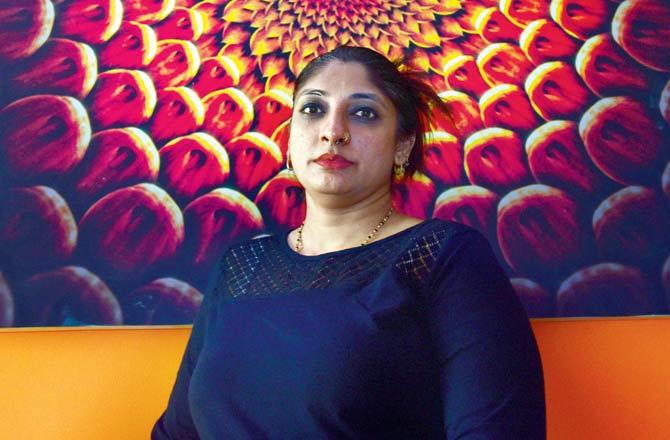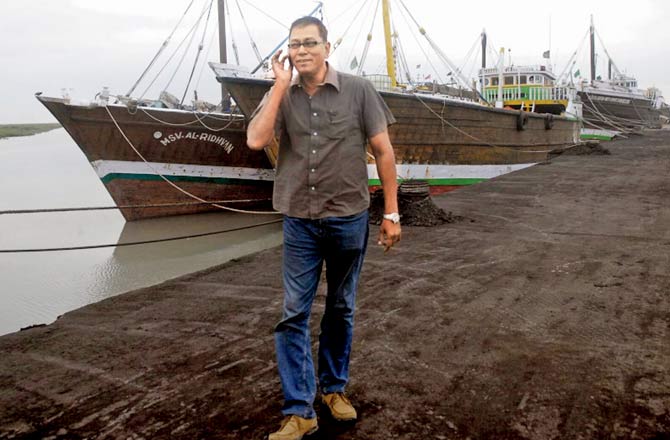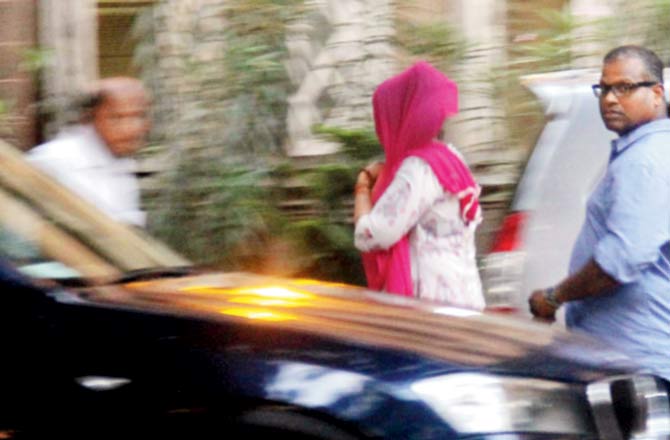Six months after being acquitted of having any role to play in the killing of mid-day's investigations editor J Dey, Jigna Vora looks back at how baseless reports and motivated rumours resulted in her arrest

Jigna Vora
It was 11.15 am on May 2 this year that the judge inside Room no. 57 of the special MCOCA court in Kala Ghoda, pronounced Accused No. 11, Jigna Vora, not guilty. Vora, 43, a former journalist and one of the prime accused in the murder of senior journalist and mid-day's investigations editor Jyotirmoy Dey in 2011, couldn't fight back the tears. The Mumbai police, and later CBI, had alleged that she had "instigated" gangster Chhota Rajan into calling for the hit job.
ADVERTISEMENT
It has been six months since that day. Her demeanour is calm as she gets up from a table at a BKC café and greets us with a hug, made awkward only slightly by a tribal mask pendant she wears around her neck. We go back 10 years, to a time we worked together in the newsroom of national daily, The Asian Age; I, a sub editor, she, special correspondent.

Jigna Vora
Her son and I share our birthdays. It was reason to have a common celebration in the four years we were colleagues. We had lost touch after her arrest. Today, we've both ordered cappuccinos. She likes hers without sugar. A slice of banana chocolate loaf is her only indulgence for the day. "This Sunday will mark seven years since my life changed forever," she says. On November 25, 2011, Vora was arrested from her Ghatkopar home and booked under the Maharashtra Control of Organised Crime Act (MCOCA) for her alleged role in the murder.
Dey, 56, had been gunned down by four motorcycle-borne men at Hiranandani Gardens, Powai, on the rain-soaked afternoon of June 11, 2011. Barely a month into the killing, the police claimed to have cracked the case. The shooters were said to be fugitive mobster Rajan Sadashiv Nikhalje alias Chhota Rajan's henchmen. The underworld was back in the game, or so it seemed, and the most sensational development was that of a woman reporter planning the killing of her ilk.

J Dey
But, when she was acquitted, and the court observed, "Even the recovery of various mobile phones and SIM cards of Vora and the relevant CDRs fail to connect… Vora with the offence in question. Hence…Vora has to be acquitted of all the charges against her," she had but one question — why hadn't anybody bothered to cross-check the facts? Maybe, she would have still been a journalist. Maybe, there would have been another truth — one that Vora, for the first time in seven years, agreed to share today with this paper.
"Do you have questions ready?" she asks, the familiarity of a known territory evident. "Just pointers," we say. "Chalo then," she says. Her controversial absence from Mumbai when Dey was murdered, which later found a mention in the supplementary chargesheet filed on June 12, 2012, is where we start. Vora was four days into a vacation with her family in Sikkim when Dey was shot. "I was having lunch at the hotel, and around 3.15 pm, I received a call from my editor, Hussain sir [former investigative journalist and author Hussain Zaidi]. He said, 'JV, Dey has been killed'.

On May 2, this year, Jigna Vora walked out of the special MCOCA court in Kala Ghoda, acquitted of all charges in the murder of Jyotirmoy Dey. File pic
Since the hotel was on a mountain top and the network was poor, the call got disconnected. I rushed to a network zone and called him back. 'Are you sure,?' I asked. Sir said the news had been confirmed, and asked me to check with Himanshu Roy [then, Joint Commissioner of Police, Crime] which hospital they were taking the body to," she says. Since Zaidi and Dey had been colleagues at The Indian Express, he had decided to check on Dey's family at the hospital, before heading to work. Vora informed Zaidi and her bureau chief about the body being at Hiranandani Hospital and rushed back to the hotel room to switch on the television. "I sat through the coverage the rest of the evening, thinking to myself, God! Who must have done this and why?"
At 6.30 pm, Zaidi called again to ask her to file a copy. But Roy, Vora's key police source, refused to divulge any information. Zaidi told her to drop it, and enjoy the rest of her vacation. "I returned to Mumbai on June 18, as per schedule. That very day, I went to the Crime Branch and inquired about the investigations," she says. By then, conspiracy theories related to the murder had birthed, with Dey's death being linked to fugitive drug lord Iqbal Mirchi and underworld don Dawood Ibrahim. Police sources had painted a colourful story around Dey's week-long trip to Europe, which he had taken a month-and-a-half before his death. Vora continued to follow the story and file developments for the newspaper. By the end of June, when the police arrested the hitmen, Vora thought the case was as good as shut.
Once, while walking through the maze of rooms at Sessions Court, Vora had offered me a piece of advice: keep an arm's length from fellow reporters, especially while on a big story. We bring it up now, and she says, "Maybe, that was wrong advice." Every scribe has her or his own rule book to make it through the dog-eat-dog world of journalism. Vora had hers; and it meant making few friends within the community. "I had just one [friend], a woman reporter. It worked against me," she says, wistfully.
It wasn't that Vora didn't want to make new friends. "I just didn't have the time." The law graduate from DG Ruparel College with a mass communications diploma from KJ Somaiya, landed her first job as court reporter at the Free Press Journal. She was 30, single and had a four-year-old son. "My life revolved around him, and his around mine," she says. Her parents and grandparents were her support after she separated from her husband.
Her day would begin early, with sending her son to school. "I'd pick him up by 11.30 am, get dressed and leave for court, and then rush to work to file my story. I'd try and return home by 9.30 pm, because my son would not eat without me. There was no question of making friends," she says. "I didn't smoke. I never drank. If I partied, it was with college friends. My social life was limited."
There were times she took her son to the Crime Branch because there was nowhere to leave him. "On Sundays, I had to take special permission from the city editor to bring him along to work. He would sit alone in the reception area of the office, and I'd quickly file my story." In 2009, when her son was eight, Vora decided to enroll him in a Panchgani boarding school. "He was being pampered by my grandparents. All I wanted was that he focus on academics and become a good human being," she says. This decision, and being a single mother became an entry point for people to cook up stories.
Soon after the police pointed to Rajan's involvement in Dey's murder, the mobster, according to a news magazine known for investigative journalism, called up several media houses between July 1 and November 16, 2011. In interviews he gave, he explained the reasons for killing Dey. Apart from alleging that Dey was getting close to Dawood Ibrahim's gang and the ISI, he also claimed that a woman journalist had "instigated" him [to kill].
In August that year, a fellow reporter told Vora that rumours were rife of her having an extra-marital affair with Dey, and that he had got her pregnant, refusing to accept her and the child. "This was apparently the topic of discussion among reporters at the Press Club. I rebuffed him, saying, 'Mujhe maloom nahin main kab pregnant hui,'" she says.
"Dey was not around to clarify, and so, the grapevine flourished." Nearly two months later, on October 31, things took a turn, when a Mumbai tabloid carried an incriminating story about a woman reporter involved in Dey's murder. While the front page article didn't mention Vora's name, and relied purely on sources, the piece was incriminating enough to point all fingers at her. "Surprisingly, this was a tabloid I had previously worked for. This is how they paid [me] back. Not once, did they bother to call, and ask what I had to say. Maybe, the story was too irresistible to hold," she says. After the article was published, Zaidi had met the editor of the said tabloid, but by then enough damage had been done. Exactly 25 days later, Vora was arrested.
"When you believe that you are innocent, you turn overconfident. I think my confidence did me in," she says. A day prior to the arrest, Vora says she went to work, and filed her story for the day. "When I came home, I received a message from a former colleague, who used to be a senior at The Asian Age, asking, where I was. He was hanging out at the Press Club, and said that reporters there had been talking about my arrest. I told him, 'It's a rumour. I am safe at home'." Vora, who is now working on a book on her life, refuses to divulge details of how events unfolded on the day of her arrest. But reports from the day after claimed that police sources had referenced recordings of several conversations between Vora and Rajan, where she was allegedly heard describing Dey's daily activities to Rajan. In that day's editorial piece for his newspaper, Zaidi had defended Vora, describing her as a "daring and enterprising" journalist, who was a vulnerable target.
Vora was remanded to police custody till December 1, after which she was moved to Byculla Women's Jail. Newspaper reports speak of 38 transcripts of conversations found between Vora and Rajan. In previous interviews, Zaidi had said that the interaction between the two in fact, unfolded in The Asian Age newsroom, and it was for an interview that he decided to publish in his capacity as resident editor.
The articles that appeared here on, before the chargesheet was filed, saw Vora being discussed for her "ruthless sense of ambition." Another spoke of professional rivalry that emerged over Rajan aide Farid Tanasha, which led her to conspire to kill Dey, "her former colleague and mentor". We ask her about this, and she quickly clarifies, "I never worked with Dey, and I didn't know him personally, so how could he be my mentor or colleague? I had no grudge [against] J Dey. I used to meet him at press conferences, and our conversations were limited to hello. Come on! He was 20 years my senior. I didn't even follow his stories, because he was a hard-core crime reporter, and I covered courts. If there were differences between us, Dey would have mentioned this to Hussain sir, as they were close. The rivalry they spoke of [between her and Dey] was the imagination of some good screenplay writers."
It was also alleged that Vora had shared Dey's motorbike numberplate details with Rajan. "But there was no proof," she argues. "My email and call records were clear, but the media didn't bother verifying the facts. They wrote anything they felt like…that I liked visiting spas and wore a lot of gold. Yes, I liked spa treatments. And, if I made a salary of over R1 lakh, I could afford it once in a while." The first chargesheet that was filed in February 2012 had described the role of each accused, but did not mention hers. The 120-page supplementary chargesheet filed in June 2012, again didn't point to professional rivalry, but attached an attendance register page from her office, citing that Vora had been on leave from June 8 to 18. It was alluded that she deliberately left the city, because she was aware of the conspiracy.
Before this, a broadsheet, citing Crime Branch sources, claimed that Vora had abruptly booked tickets to Sikkim on June 7 and took off without sanctioned leave. She tells us now that the tickets had been booked two months prior, and several of her colleagues, including Zaidi, who had granted the leave, were aware of the trip. In fact, the news magazine that carried out an investigative piece on Dey's murder, had been given a copy of the ticket she booked on Kingfisher flight IT 3167 from Mumbai to Guwahati at 4.37 pm on April 7, 2011, by a relative.
Vora says the media witch-hunt could be a product of a story too good to let pass. There was another reason that some reports mentioned. In a beat dominated by male journalists, Vora's career climb in just six years — from court correspondent at 30 to a deputy bureau chief at 37 — was unusual. "People said I had various ways of influencing my sources. If you are a single woman, and have reached a certain stage [professionally], it is implied that you have definitely
slept around." But Zaidi, who witnessed her rise, chooses to be critical. "Jigna's overconfidence in her ability to get a good story and her devil-may-care attitude earned her a lot of enemies, both within the fraternity and the police. This eventually led to her downfall." We ask her about this, and Vora agrees. "I was immature and couldn't handle my success."
Vora remained in jail for nine months. "It was a jail… of course, it had to be bad. But the toughest part about the experience was my having to digest that I was there for doing nothing. All through those months, there wasn't a single day when I didn't break down," she says, choking. "One day, when my son visited, he said he was praying for me; that I'd be out. That day, I decided, I was going to be tough for him. I was only answerable to him, my parents and grandparents." Soon after she was granted bail on July 27, 2012, Vora lost her grandmother. "I had too many uncertainties facing me professionally. I knew it was difficult to get back to reporting. I was scared of coming out [of jail] because I didn't know how society would look at me. I was labelled a woman from the underworld, a prime accused and a murderer. I wasn't sure how my family would react to my presence," she recalls.
Vora's mother passed away on June 9, 2015, a day after the MCOCA charges were framed. "She read the news that morning about my being prime accused. Later that day, she suffered a heart attack. Her sugar levels had suddenly shot up." In those intervening years, Vora says it was meditation that kept her going. "I did a lot of research on chakra meditation, and started learning new healing techniques. It gave me positivity," she says. Vora also learnt tarot card reading, and now, holds sessions professionally alongside taking meditation classes at home, and offering private consultancy on healing techniques. "Everything, including loneliness, depression and anxiety, can be dealt with by balancing the seven chakras or energy centres in your body," she says. We ask how, and she pushes her wrist forward to display the many semi-precious stone bracelets stacked on it. "They help clean your aura."
It was in August 2016 that Vora saw a ray of hope when the third 300-page chargesheet barely discussed her role in the crime. Most importantly, while the chargesheet quoted a journalist saying that Rajan in a telephonic interview told him that Vora had provided him information on Dey, the statement did not mention any emails sent by Vora to Rajan with Dey's details. Evidence was thin. "I kept telling myself to hold on…. the truth would be out," she says. She suffered the biggest blow when she lost her grandfather last year. He had stood by her, footing her legal bills, and visiting her in court. "When he'd come to see me in jail, he was old and in his late 80s. They'd keep him waiting all day, without water. I told him not to invite the humiliation. But he would cheer me up."
On the day of the judgment, Vora's legal team was confident she'd walk free. "Two days prior, a leading daily had run a front page story about a possible death sentence if I was convicted," she recalls. That report broke her. "I told my son, there's a possibility I won't come back. The media can make someone, it can also break someone." She jumps back into the present, whipping out her phone to show us pictures of her son, now 18, and at a hotel management school in Pune.
"He makes a good model, but I've told him he is there to study. Make me proud." She is still struggling to make ends meet, she says. "So many people hounded me for an interview after I was acquitted, but no one approached me, asking 'Jigna do you want a job?'" Until stability finds her again, she is seeking joy in the little things. She is researching for a web-series with Zaidi, and trying to wrap up the book. But, nothing will come close to being a journalist. "I can't forget those days — running around, hunting for stories, struggling to get quotes from cops and lawyers. I miss that thrill."
Catch up on all the latest Crime, National, International and Hatke news here. Also download the new mid-day Android and iOS apps to get latest updates
 Subscribe today by clicking the link and stay updated with the latest news!" Click here!
Subscribe today by clicking the link and stay updated with the latest news!" Click here!







